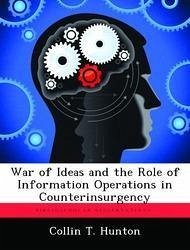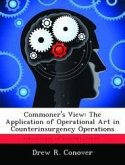Since the attacks of September 11, 2001, the United States'; armed forces and its coalition of allies have become deeply entrenched in the counterinsurgencies of Iraq and Afghanistan. These struggles are not just counterinsurgencies, but they also represent the front lines of the nation's "War of Ideas" between Western ideology and Islamic extremism, where influence and management of perceptions is paramount. Because of the inherently political nature of counterinsurgency (COIN) operations coupled with the dynamics of conflict within the information age, the role of information operations (IO) has assumed a new level of importance. As the US and its coalition partners continue their COIN efforts, it is clear that the increased role of IO relative to kinetic operations has been greatly misunderstood. This circumstance is due in large part to a lack of common understanding of IO concepts and definitions within the military community and a deficiency of coherent doctrinal guidance on how to properly integrate IO into COIN operations. In consideration of these doctrinal shortfalls, commanders who have been uncomfortable with the concept of IO have commonly subordinated its importance to the more tangible kinetic elements of COIN operations. This monograph analyzes the historical development of US IO doctrine and provides a discussion of the way ahead for common understanding among the services. Investigation into Clausewitz's theory of political conflict helps to reinforce how the role of IO relates to kinetic operations based on the assessed nature of the conflict. Finally, an assessment of the new COIN manual FM 3-24, and analysis of the many considerations for proper understanding of the information environment provide scope to the challenges ahead for US forces in the COIN conflict. The monograph identifies that while new Joint IO and Army COIN doctrines have provided a solid foundation for a change in understanding of the necessities for this contemporary conflict
Hinweis: Dieser Artikel kann nur an eine deutsche Lieferadresse ausgeliefert werden.
Hinweis: Dieser Artikel kann nur an eine deutsche Lieferadresse ausgeliefert werden.








